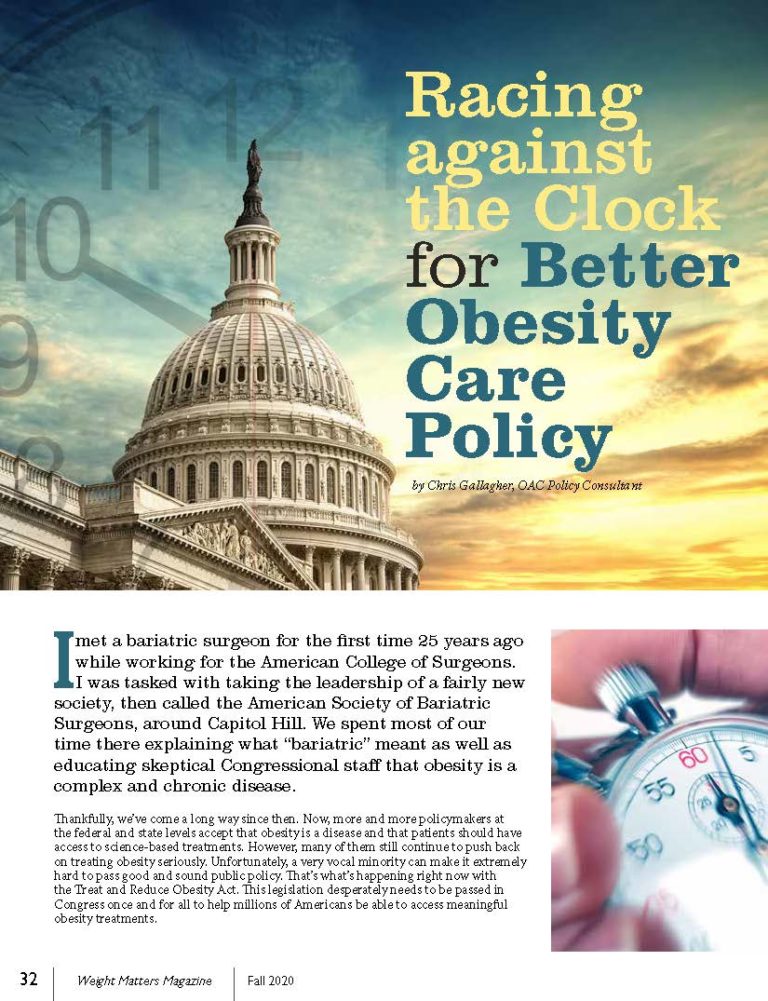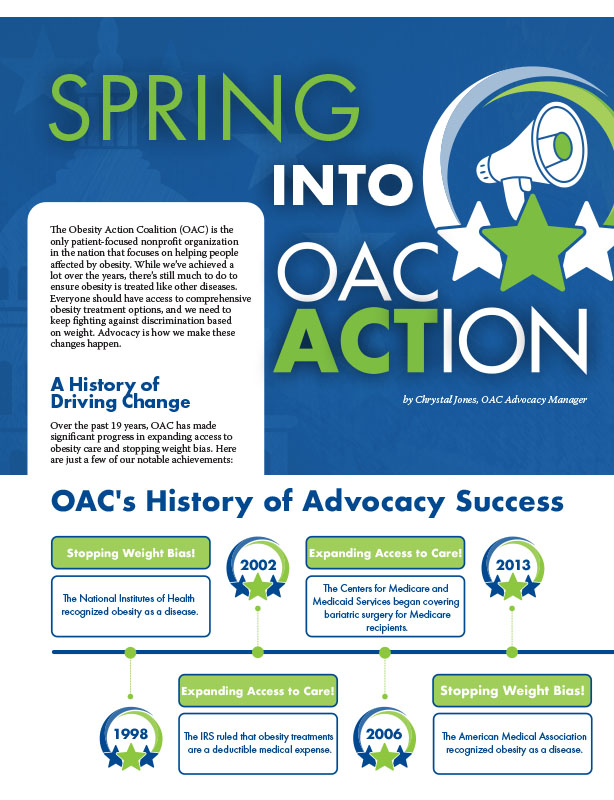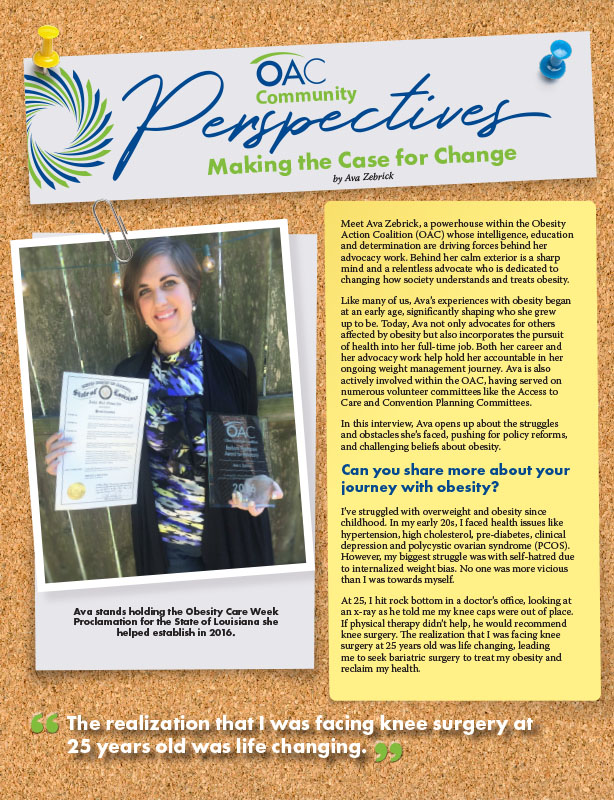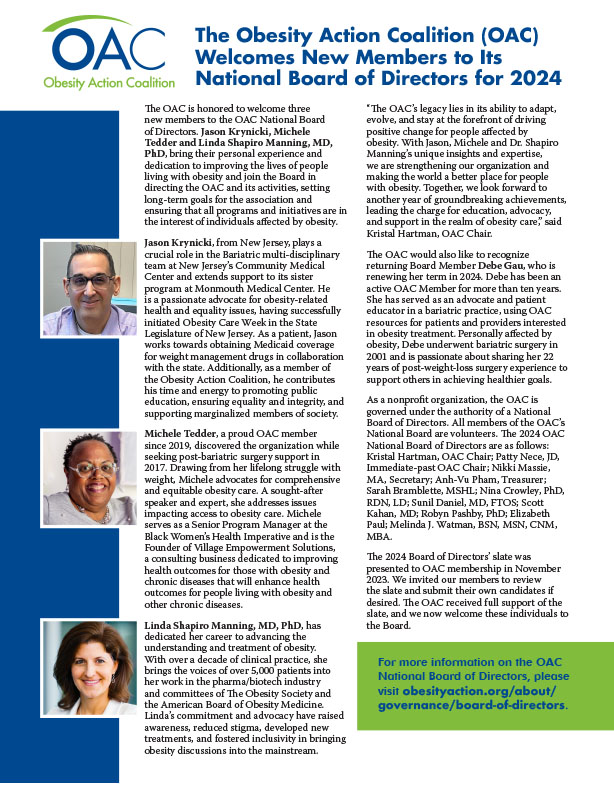Racing against the Clock for Better Obesity Care Policy


by Chris Gallagher, OAC Policy Consultant
Fall 2020
I met a bariatric surgeon for the first time 25 years ago while working for the American College of Surgeons. I was tasked with taking the leadership of a fairly new society, then called the American Society of Bariatric Surgeons, around Capitol Hill. We spent most of our time there explaining what “bariatric” meant as well as educating skeptical Congressional staff that obesity is a complex and chronic disease.
Thankfully, we’ve come a long way since then. Now, more and more policymakers at the federal and state levels accept that obesity is a disease and that patients should have access to science-based treatments. However, many of them still continue to push back on treating obesity seriously. Unfortunately, a very vocal minority can make it extremely hard to pass good and sound public policy. That’s what’s happening right now with the Treat and Reduce Obesity Act. This legislation desperately needs to be passed in Congress once and for all to help millions of Americans be able to access meaningful obesity treatments.
The Treat and Reduce Obesity Act: A Quick Overview
The Obesity Action Coalition (OAC) has been supporting the Treat and Reduce Obesity Act (TROA) for years, but if you’re unfamiliar, TROA is a critical bipartisan bill that will give older Americans with Medicare coverage greater access to obesity healthcare services, treatments and providers. Specifically, the bill will expand Medicare coverage to include:
- FDA-approved prescription medications for chronic weight management
- Intensive behavioral counseling services
The good news is that TROA currently has very strong support from more than 185 Republican and Democratic members of Congress! The concerning news, however, is that despite its momentum, the bill has still yet to come up for a committee or floor vote since it was first introduced in 2013.
What’s Taking So Long?
The primary sponsors of TROA in both the House of Representatives and Senate have worked extremely hard since 2013 to grow support for the bill and make others see the critical need for available treatments. Unfortunately, Congress as a whole has not yet been willing to take on the issue of making sure patients have access to comprehensive obesity care.
Why is this? Well, the bill has been met with a lot of resistance, mostly because of a lack of understanding about obesity as a disease. A lot of that is due to weight stigma. Some policymakers in Congress are afraid that it would be way too expensive to provide treatment coverage for millions of Americans affected by obesity. Others believe that the solution isn’t to provide care, but to be better at efforts aimed at prevention.
Frankly, some in Congress still believe that people with obesity “did it to themselves” because they don’t have the willpower or discipline to make healthy lifestyle choices. They think people with obesity just need to eat less and move more. Of course, this couldn’t be further from the truth!
The bottom line is that the OAC and other health advocates have done a tremendous amount of work to show the need for TROA, and there have many been great and promising strides. But to get TROA across the finish line, we must add more diverse voices to the fight.
COVID-19: A Sounding Alarm
What has become apparent in the last decade is that the issue of obesity care lacks urgency. But now there’s a new factor to consider: the arrival of Coronavirus (COVID-19) on our shores.
In just a few short months of navigating this pandemic, we learned that obesity is the second greatest risk factor for hospitalization among COVID-19 patients, only after old age. In fact, data from New York City shows that people with COVID-19 and obesity are twice as likely to be admitted to the hospital and 3.6 times more likely to require critical care like a ventilator.
In late June, the Centers for Disease Control and Prevention (CDC) updated its website to say that all Americans with obesity, regardless of age, are at increased risk of severe illness from COVID-19. That means more than 100 million people in our country are now potentially in danger from serious illness or even death during this pandemic. Quite tragically, many federal and state policymakers still don’t see obesity care as a high priority issue.
Those who do support TROA in the House and Senate have been instrumental in organizing a group of 44 members of Congress to write a letter to Congressional leadership regarding this critical legislation. The letter urges Congress to include the provisions of TROA in any future legislation for pandemic relief. Right now, it’s more important than ever that you and me add to their efforts. Together, we have to create a sense of urgency on the need for a national policy on access to obesity care which can save millions of Americans from the threat of COVID-19.
How You Can Help
So, what can we do, and what can you do, to open the eyes of local and national policymakers? For starters, you can visit the OAC Action Center at ObesityAction.org/Action-Center. There, you will find opportunities to tell Congress, your Governor and your state representatives that now more than ever, everyone in our country must have access to all science-based obesity treatment options as well as health plan coverage.
At the Federal Level, You Can: Call on your members of Congress to pass TROA – either as a freestanding bill or part of pandemic relief legislation. You can do this specifically at ObesityAction.org/TROA
On the State Level, You Can: Let your Governor, State Insurance Commissioner and elected officials know about the recent statement made by the Obesity Care Continuum (OCC), of which the OAC is a member. The statement, “Patient Access to Care Issues Surrounding Obesity and COVID-19,” calls on state policymakers to treat obesity seriously. It highlights that while there are evidence-based treatments for people with obesity that can lessen the impacts of the disease and improve health outcomes, current obesity care coverage across the country is falling behind. There are too many barriers preventing people from getting help.
The statement also emphasizes that obesity affects more than 100 million Americans – and while our nation and those around the world are appropriately focused on COVID-19, obesity is a pandemic in its own right that we need to respond to!
Making Our Voices Louder and Bolder
The fight for obesity care policy has come a long way, but we have farther to go – and right now, we are at a crossroads. In order for things to change, our voices need to be louder. We have to be visible and steadfast in our advocacy.
Above, I mentioned easy things you can do just by taking a few minutes to go online. Next, we all need to get out of our comfort zones and truly engage with policymakers. For example, you can participate in future virtual advocacy days that the OAC is planning to organize. Please sign up for these events as we release details or let the OAC know if we can rely on you to help us at the local level. If you’re interested in joining the OAC’s advocacy efforts, please send an email to mburrows@obesityaction.org.
Don’t be intimidated by the task in front of us or discouraged by the long road we’ve traveled with obesity care policy. With hard work comes reward. Look at the great movements of the last 40 years surrounding AIDS and HIV, mental health, LGBTQ rights and Black Lives Matter.
We CAN do this! We clearly have the numbers on our side, and we each have a motivation, a message and a personal story to tell. The big question will be if, and how, we tell these stories to make sure they are finally heard.
About the Author:
Chris Gallagher is the Obesity Action Coalition’s (OAC) Policy Consultant and also serves on the Access to Care Committee. He has more than thirty years of legislative and lobbying experience where he has specialized in healthcare, tax and education issues. He currently manages several healthcare issues while working with different organizations.
by Chrystal Jones, OAC Advocacy Manager Spring 2024 The Obesity Action Coalition (OAC) is the only patient-focused…
Read Articleby Ava Zebrick Spring 2024 Meet Ava Zebrick, a powerhouse within the Obesity Action Coalition (OAC) whose…
Read ArticleThe OAC is honored to welcome three new members to the OAC National Board of Directors. Jason Krynicki,…
Read Article








